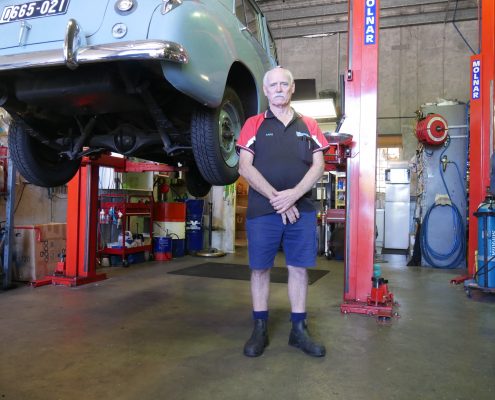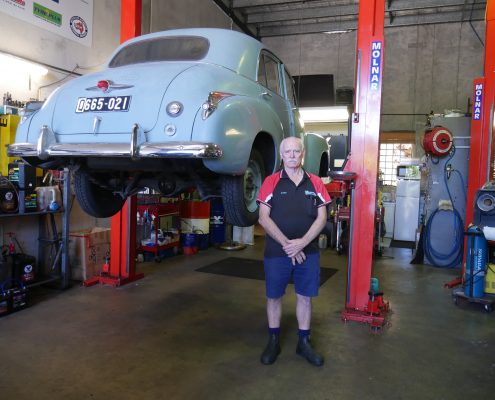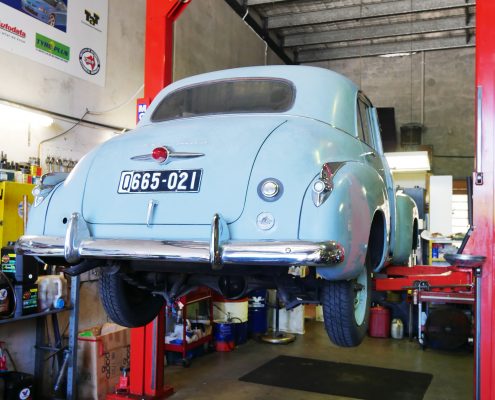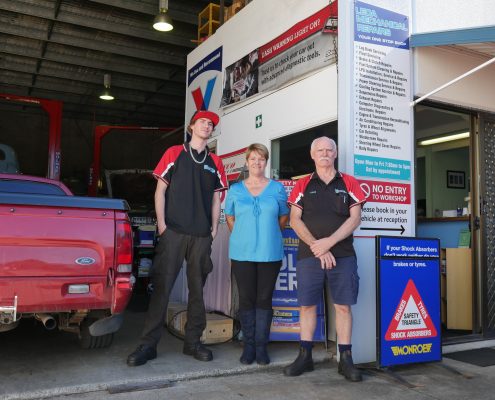MTA Q&A
Leda Mechanical
Gary Mollross has been working in the automotive industry for more than 50 years. In a career that began in Sydney working with a BMC dealership, through stints working with heaving machinery in the mines, metropolitan bus services, mobile servicing and classic car restoration, there isn’t much Gary hasn’t seen. His knowledge and experience are second to none and for the past 18 years he has owned and run Leda Mechanical, providing general mechanical and restoration services to clients across southeast Queensland.
What products and services does Leda Mechanical provide?
GM: We do general servicing on all makes and models, fleet servicing, diagnostics, air conditioning, and I personally do restorations and repairs on older and classic vehicles – anything up to late 80s. We also do LPG installs, serving and repairs. Although LPG isn’t as popular as it once was here in Queensland, it is still very popular in South Australia and Victoria and we get a lot of people who have moved from the southern states, who have LPG vehicles, and who are looking for somewhere to go.
The restoration work is my passion.
I’ve been in the trade for a long time and, of course, worked on my own cars over the years – Monaro’s, VH Commodores and so on. I have a number of customers who come to me with their older cars because there are very few people around now that can work on them properly and know all the nuts and bolts about them.
How long has the business been operating?
GM: Since 2000. It had been running for about 5 years before that but had shut its doors, so I basically bought an empty shed and some second-hand equipment. There were no customers, no suppliers, no nothing so I had to generate everything from scratch.
It was hard. I didn’t take wages for a long time and turned the money back into the business to get it up and running.
It took a while.
What’s you background in the industry and why the automotive industry?
GM: I did my apprenticeship in Sydney and am now in my 55th year working in the industry!
I wasn’t a brilliant student at school and one of my mates was going to be a mechanic, so I thought ‘why not?’. At the same time my father, who was a carpenter, said, ‘Don’t be a carpenter’, so I decided then that I would become a mechanic!
I was 14 when I left school but couldn’t get a job until I was 15, so I got on to a pre-apprenticeship scheme before starting my apprenticeship.
I remember my mum’s words at the time were, ‘Anyone can be a motor mechanic, but if you want to be a good one, you have to study hard’.
My apprenticeship was with York Motors, which owned a heap of dealerships in Sydney, and I was at the Lancaster Motors dealership located right in the city, where Darling Harbour is now.
Back then everything was done in-house. There was the workshop and a machine shop, we had a truck section, a panel beating shop, a paint shop, a trim shop and we even had a dyno – which not many workshops had at the time – and as apprentices we had to spend time in the auto electrical and wheel alignments sections too.
We basically covered everything in the trade and dealt with a lot of vehicles including Minis, Studebakers, Princesses, Morris 1000s and 1800s. I remember the James Bond Aston Martin DB5 came in during preparation for the Sydney Motor Show. I was working in the machine shop at the time and we had to build a rotating stand for it to sit on when it was on display. I didn’t get to drive it, but I did sit in it!
When I finished my apprenticeship, my papers said I was an Automotive Engineer. And it said that because that is what we were – we did head repairs, crankshaft grinding, rebores, everything to do with rebuilding a motor. We had learned a wide array of skills and that has held me in good stead over the years. Added to that, when I completed my apprenticeship, I spent two years doing what was called a ‘journeyman’s course’ in panel beating. I did that two nights a week and picked up skills that I am still using today.
I would go on to spend a couple of years in South Australia working for BHP at an open-cut mine servicing and repairing compressors, generators, cranes, 75-tonne dump trucks, caterpillars, loaders – pretty much anything that moved! I enjoyed that experience a lot.
Then I went back to Sydney to work with what is now Sydney Buses. I was there for 11 years working on the bus fleet before moving up to the Gold Coast about 30 years ago where I did a variety of work, including being mobile for a while, before buying Leda Mechanical.
In your career you would have seen a lot of changes. Where do you think the industry is headed?
GM: The biggest change for me was when I left Sydney Buses in 1987. I had been there since about 1975 and had worked mostly on old diesel buses and some of the newer Mercedes buses that came through in the mid-80s. That meant that on the car side of things I had missed developments in areas such as emission controls and computerisation – I had to learn all of that.
Looking forward from today, I think there is going to be a big jump and some of what we see on the road now, such as hybrids, are only interim vehicles. I think there will be a big jump to electric and I do think flying cars won’t be far behind. I don’t know whether I will live long enough to see it, but I really feel these developments are going to happen a lot quicker than many people envisage. It wouldn’t surprise me if in 20 years there were hovercraft-type cars.
Having said that, I also believe that classic cars will always be around. People have a passion for them and I can’t see that ending. And they are fabulous cars!
Regarding the restoration side of the business, are your customers interested in their cars being as original as possible?
GM: Generally, my customers just want to get their cars on the road, but I do try to keep them as original as possible and try to source good second-hand parts.
The main source of parts for a lot of these vehicles is actually swap meets. I am amazed at how many parts people still source from swap meets and that tells me that there must be thousands of cars undergoing restoration.
There is also a network of people who do the same sort of work as me and have a store of parts of their own or know where to get them. That means that I’ll buy from them and they’ll buy from me, and it also means that if they go to a swap meet and see something they think I might want, they’ll call and let me know.
You can source almost anything if you know where to look for it.
How many staff do you have?
GM: There’s me, Karen my sister-in-law, my wife who does the business financials, and Scott my apprentice who has been with me for nearly three years and who recently won the Apprentice of the Month award from MTA Institute. There is always more to learn about the finer points, but I am proud of his achievements.
To what do you attribute your success?
GM: A lot of hard work. A business will always have its ups and downs and you must be able to ride them out.
So, you need dedication to what you are doing and an appreciation of your customers – without them you have no business. We, for example, give our customers incentives such as 10 per cent off labour costs if they answer an SMS reminder we send when their service is due. And if they refer someone to us, they get $20 off their next service. These are incentives for them to come back to us.
The other thing that has helped is membership of Associations. I am an MTAQ and IAME member and have been a Capricorn member since 2001. They have been a fantastic help and I would recommend every mechanical business be a member. No one can know everything, and these organisations can help.
It’s the same with other mechanics in the area. We bounce things off each other. If I have a problem I know I can run it past two or three others to see if they have come across it before and so on.
It’s a good network.
What does the future hold?
GM: Well, I am nearly 70 and I can’t keep working forever, but I’ll keep going for a while yet.
What do you do with your spare time, if you have any?
GM: When I am away from the business, I am either working on the house, playing golf, or at a Titans games – I am a Titans member and go to as many games as I can.
Click here to find out more information on Leda Mechanical
14 Jul 2018













